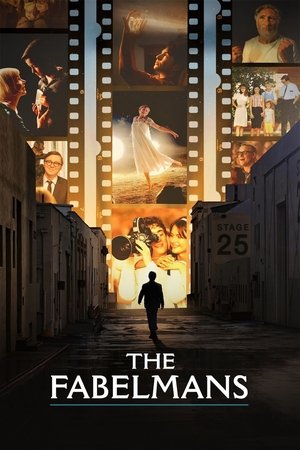The Fabelmans London film premiere 2024
Loosely based on Spielberg's childhood growing up in post-World War II era Arizona, from age seven to eighteen, a young man named Sammy Fabelman discovers a shattering family secret, and explores how the power of movies help us see the truth about each other and ourselves.

The Fabelmans London Premieres null
- Status: Not information yet
- Date: Not information yet
- Location: Not information yet
- Release in Cinemas: 2022-11-23
- Runtime: 151 minutes
- directors: Steven Spielberg
Planning to attend the film premiere? Find more information regarding tickets, wristbands the times usually the premieres are taking place at London Film Premieres
Watch The Fabelmans Trailer
Did you know ... ?
- Steven Spielberg claimed that although he and Tony Kushner had discussed the idea of the movie for years, it was during the COVID-19 pandemic in 2020 that he decided to write the screenplay with Kushner from scratch while his schedule was clear. The two of them wrote the script from their homes during lockdown and finished it in two months.
- For the scenes of Sammy filming his own 8mm films, Steven Spielberg decided to have the character re-create the exact ones he made during his childhood, and worked with cinematographer Janusz Kaminski to ensure that they were portrayed as accurately as possible, but with improvements in the camera angles. A few of the films portrayed in this film include the Western short film that he made with his fellow Boy Scout friends in order to earn the photography merit badge, the war short film Escape to Nowhere (1961), in which he used his school bully by casting him in the lead role in an effort to face his fears, and Spielberg's re-creation of the train wreck scene from Cecil B. DeMille's The Greatest Show on Earth (1952). Spielberg remarked "It was joyful being able to recreate those films. ... I shot a lot of films when I was a kid on 8mm. It was unique in those days. Not a lot of people were going out and shooting in 8mm. It was physical; it was a craft. You had to sit there with a...splicer, and then you had to scrape the emulsion off the film in order to get a seal so when you put glue on it, you literally glued the film together. And I must say, I miss it."
- During filming, the cast gained access to home movies, photographs, and recollections from Steven Spielberg's family's past to learn what they were like and how to portray the fictionalized versions of them (The Fabelman family) on screen, while making them feel fresh and original. Paul Dano reflected: "It was overwhelming and it was sort of a heavy cloak to bear because we were with someone who was having a big experience everyday, revisiting and reworking through a part of their life... For somebody like Steven to share that much of himself with us - with the audience too - it was really a profound experience."
- Seth Rogen told reporters that Steven Spielberg often became emotional on the set during production. "It was a very emotional experience. He was crying a lot on set," he said. "It's very directly based on his life and pretty much everything that happens in the movie is something that happened to him. As we were shooting, I'd be like, 'Did this happen in real life?' and the answer was 'yes' a hundred percent of the time."
- David Lynch requested that he be given his costume as John Ford a week before filming his scene to break it in.
- The 8mm and 16mm camera props used in the film had real film inside them, with Gabriel LaBelle being taught how to use the cameras, so that what was shot with them on set could be developed for usage in the film, as well as how to cut and splice film stock using the editing machines and film projectors of the 1950s and 60s.
- The film's development goes back to 1999, when Steven Spielberg considered directing a film about his childhood for some time, with its initial incarnation being titled "I'll Be Home". It would have been directed from a screenplay written by his sister Anne Spielberg (who inspired the character of Reggie Fabelman in this film).
- Steven Spielberg said his parents had been "nagging" him to put them on the big screen prior to their deaths. "They were actually nagging me, 'When are you going to tell that story about our family, Steve?' And so this was something they were very enthusiastic about," he said. He also shared what finally prompted him to make The Fabelmans: "I started seriously thinking, if I had to make one movie I haven't made yet, something that I really want to do on a very personally atomic level, what would that be? And there was only one story I really wanted to tell." He also said The Fabelmans is "the first coming-of-age story I've ever told." "My life with my mom and dad taught me a lesson, which I hope this film in a small way imparts," he told The Hollywood Reporter. "Which is, when does a young person in a family start to see his parents as human beings? In my case, because of what happened between the ages of 7 and 18, I started to appreciate my mom and dad not as parents but as real people."
- This may likely be one of the last collaborations between Steven Spielberg and John Williams. According to reports, Williams (who will turn 91 in February 2023) is planning to retire (from composing for films, he said he will still write concert music) after composing Indiana Jones and the Dial of Destiny (2023). He also added that saying "no" to Steven Spielberg wasn't an easy thing to do.
- Steven Spielberg's first screenplay credit since A.I. Artificial Intelligence (2001).
- Gabriel LaBelle was initially not cast as Sammy Fabelman until after being given a callback three months after his audition. On finally reading the script and learning the details about his character being a fictionalized version of Steven Spielberg himself as a teenager for mostly the entire film, he recalled, "When I was auditioning, the character's name was Teenage Sammy - I thought as opposed to Adult Sammy ... I get the script and you're reading it for 30 pages and he's 6 and 8 years old. Page 35 or so Teenage Sammy comes along. OK, good! Now this is my part. It's going to be a three-act movie, it's going to be a Moonlight (2016) or something. I kept waiting for my exit but it never came."
- Paul Dano ordered and built a crystal radio set to get the feeling of how Arnold Spielberg worked with electronics in order to prepare for the role of Burt Fabelman.
- Steven Spielberg had envisioned Michelle Williams as Mitzi, the character inspired by his mother Leah, ever since he saw her performance in Blue Valentine (2010).
- Steven Spielberg admitted that when re-creating his amateur movie, he improved on the original coverage and camerawork: "If I see a good shot, I can't help it."
- Most of the characters in this film are fictionalized versions of real people in Spielberg's life, given new names. There are two exceptions to this. John Ford is, of course, meant to be the historical John Ford. Spielberg had an Uncle Boris as well.
- Gabriel LaBelle rewatched some of Steven Spielberg's films, such as Empire of the Sun (1987), and constantly had conversations with Spielberg to learn more about his life in order to prepare for playing Sammy.
- The jewelry that Michelle Williams wore as part of the costumes for Mitzi Fabelman was, in fact, some of Leah Adler's, including a charm bracelet that had pictures of all four of her children.
- In March 2022, cinematographer Janusz Kaminski provided more information on the film's plot. He revealed that the film will chronicle Steven Spielberg's life from age seven to eighteen and that it deals with "his family, with his parents, conundrums with his sisters, but primarily deals with his passion for movie-making", while adding that it will touch on the themes of "young love, parental divorce, and early formative relationships.... It's a very beautiful, beautiful personal movie. It's very revealing about Steven's life and who he is as a filmmaker."
- Paul Dano's last scene as Burt Fabelman in the film was actually shot on the anniversary of Arnold Spielberg's passing.
- The film received a strongly positive reception at its world premiere at the Toronto International Film Festival, receiving two standing ovations from the audience, one before the film when Steven Spielberg took the stage to introduce it, and a longer one preceding the post-film Q&A. The crowd was also reported to have been loudly chanting Spielberg's name while outside waiting to get into the theater during the red carpet arrivals.
- This is the fourth collaboration between Steven Spielberg and Tony Kushner, and the first screenplay they've written together. Kushner had previously written Munich (2005), Lincoln (2012), and West Side Story (2021), which all were directed by Spielberg.
- The 8mm camera that Sammy Fabelman uses to film his family's camping trip and his "Escape to Nowhere" short film was kept by Gabriel LaBelle as a souvenir after the completion of filming.
- To look the part of Sammy Fabelman and make the character look almost similar to Steven Spielberg's teenage appearance, Gabriel LaBelle had his hair straightened and changed the way he stood and walked, as well as retrained his muscles to mimic Spielberg's smile.
- Steven Spielberg's first film to have a world premiere at the Toronto International Film Festival.
- When Bennie (Seth Rogen) eats the spider hidden under the plate, he says, "If there's anything I'm a sucker for, it's licorice." This is a quote from "Adam's Rib" (1949), in which Adam (Spencer Tracy) says the line after he bites off the end of a licorice gun.
- The words "spiel" and "fable" are synonyms for the word "story".
- The trumpet player who plays terribly when the Prom band performs 'Walk on By' is a reference to a character in the opening of Indiana Jones and The Last Crusade.
- There are several allusions to E.T. including the scene where young Sammy is scared by his trains colliding and knocks down an entire shelf; the shot of the boy scouts riding bikes with baskets attached; the use of closets for poignant scenes; and the scene where Sam inadvertently shows his dad the photo of Mitzi and Bennie.
- The shot of Sammy Fabelman using his hands as a makeshift screen, aiming the projector at his open palms, was singled out by critics as the film's most iconic.
- The film was coincidentally released the same year as the 70th anniversary of Cecil B. DeMille's The Greatest Show on Earth (1952), the first film Steven Spielberg ever saw as a child, an event which is dramatized in this film as Sammy's parents take him to see it and he gets dazzled by the train-wreck sequence.
- First film from Steven Spielberg to be distributed by Universal Pictures since Munich (2005).
- Samuel Fabelman is the fictionalized Steven Spielberg. He is named for Spielberg's grandfather, who had the original Hebrew form of the name, Shmuel Spielberg.
- The film premiered in 2022 amid a recent cycle of similar films by other directors who set their movies in the time and place of their childhood and adolescence. Similar films include: Mike Mills' 20th Century Women (2016), Greta Gerwig's Lady Bird (2017), Alfonso Cuarón's Roma (2018), Jonah Hill's Mid90s (2018), Quentin Tarantino's Once Upon a Time in Hollywood (2019), Kenneth Branagh's Belfast (2021), Paolo Sorrentino's The Hand of God (2021), Paul Thomas Anderson's Licorice Pizza (2021), Richard Linklater's Apollo 10½: A Space Age Childhood (2022), and James Gray's Armageddon Time (2022).
- Long before they started working together on several movies, Tony Kushner mentioned Steven Spielberg in a line of dialogue in his Pulitzer Prize-winning play Angels in America: A Gay Fantasia on National Themes.
- This is director Steven Spielberg's first collaboration with longtime composer John Williams since The Post (2017).
- Michelle Williams previously starred in the TV show Dawson's Creek, in which the lead character, Dawson, is a teenager and aspiring filmmaker who is obsessed with Steven Spielberg.
- This film is possibly inspired by 24th Raindance Film Festival (2016), in which a Brazilian crew made a tribute short film based on the childhood of director Steven Spielberg. After the short movie debut in 2016, the Brazilian director, Filippo Capuzzi Lapietra, took a course with the cinematographer Dan Mindel and showed the short film to him, saying that his dream was for this film to reach Spielberg's hands. Dan then passed the film on to J.J. Abrams, who then forwarded it to Spielberg, who by email praised the project. In his words: "Ha-Ha! That may just be the sweetest tribute I have ever seen! Thank Dan Mindel's students. They got it right. The bigger we dream the more we can expect to achieve."
- Was named by former United States President Barack Obama as his top pick for the list of his favorite films of 2022.
- Filmed during the COVID-19 pandemic.
- A scene in the film Paul (2011) features the titular alien voiced by Seth Rogen on the phone with Steven Spielberg, in the middle of developing his sci-fi classic E.T. the Extra-Terrestrial (1982). The Fabelmans is the first time Rogen and Spielberg have worked together since.
- John Ford directed Russ Tamblyn in How the West Was Won. David Lynch directed him on Twin Peaks.
- Sammy's mother buys a pet monkey, and Sammy himself later meets director John Ford. Ford also had a bad experience involving a monkey. When beginning his career at Universal Pictures, Carl Leammle Jr., son of studio founder Carl Laemmle, had a pet monkey that he insisted on keeping with him at screenings, until Ford demanded it be removed.
- Michelle Williams' first film was Species, which paired her with several Spielberg veterans: Marg Helgenberger (Always), Alfred Molina (Raiders of the Lost Ark), and Ben Kingsley (Schindler's List).
- Judd Hirsch appeared in Independence Day (1996) as the father of Jeff Goldblum's character. Goldblum appeared in Spielberg's films Jurassic Park (1993) and The Lost World: Jurassic Park (1997).
- Paul Dano and Michelle Williams both starred in at least one Hugh Jackman movie; Dano was in Prisoners (2013) and Williams was in both The Greatest Showman (2017) & Deception (2008).
- Author Joyce Carol Oates tweeted that the scene with David Lynch playing director John Ford was"the most imaginative scene," but said the film overall was "a remarkably mediocre movie for all its attention and the recent award." She added, "Must be discouraging for young filmmakers."
- During the Q&A at an Oscar-qualifying screening for the film on November 7, 2022, Steven Spielberg revealed that it took three weeks to convince David Lynch to be a part of the film, with Tony Kushner's husband Mark Harris taking credit for suggesting Lynch to Spielberg, and Laura Dern calling Lynch numerous times to get him to commit. In response, Lynch said he would take it as long as there were bags of Cheetos on set as refreshments.
- Gabriel LaBelle was unaware of the casting of David Lynch until the day the scene he had to do with him was filmed. He recalled that once Lynch came onto the set, it enabled him to embody Sammy and how he was feeling, recalling "[Lynch is] a great guy. But leading up to it, Sammy's nervous, so I'm getting nervous."
- In real life Spielberg blamed his dad for the divorce. His dad still very much loved his mother and took the blame for the divorce in order to protect her and Steven didn't find this out till later. Because of this Steven Spielberg distanced himself from his father for fifteen years.
- Steven Spielberg's mother in real life, Leah, ended up marrying Bernie Adler, the person whom Seth Rogen's character was based. She died as Leah Adler.
- Spielberg did nearly abandon filmmaking in real life for a period of time. But, not because of what happened with his parents: the 16-year-old Spielberg had a crisis of confidence after seeing David Lean's epic "Lawrence of Arabia." "When the film was over, I wanted to not be a director anymore," he said in an HBO documentary, "because the bar was too high. "I had such a profound reaction to the filmmaking, and I went back and saw the film a week later," he added. "I saw the film a week after that, and I saw the film a week after that, and I realized that there was no going back. This was going to be what I was going to do or I was going to die trying."
- Although there were many painful and heavy years, Steven his mom and his dad would all eventually find peace and reconciliation. Arnold remarried, tying the knot with Bernice Colner Spielberg. He organized and recorded Holocaust testimonials. Leah eventually moved to Los Angeles and opened a kosher deli called The Milky Way. The two were eventually able to become good friends.
- The final shot of Sam Fabelman starts with the horizon being in the middle of the frame, then the camera moves to a low-angle shot with the horizon at the bottom of the frame (as per John Ford's advice) to make it look more interesting.
- John Ford (David Lynch) explains composition to Sam Fabelman by directing his attention to paintings hanging in his office. Lynch was himself a painter before he became a filmmaker.
- According to Paul Dano, the shot of Sammy Fabelman seeing his reflection in the mirror filming with his camera during Burt and Mitzi's announcement of their divorce wasn't initially scripted, as was the film's iconic shot of young Sammy projecting the image of his first 8mm film onto his hands.
- Steven Spielberg directs David Lynch in this film. Lynch previously directed Blue Velvet (1986), which featured Spielberg's then-mother-in-law Priscilla Pointer and Laura Dern, who appeared in Spielberg's film Jurassic Park (1993). Spielberg had also expressed interest in directing the Season 2 premiere of Twin Peaks (1990) before Lynch took it on himself.
- In this film, Michelle Williams' character leaves her family for Seth Rogen's character. In Take this Waltz (2011), William's character leaves her husband, played by Rogen, for another man.
Genre
Drama
Cast

















Marco Gomes
I'm a movie enthusiast and creator of London film premieres, a blog sharing upcoming premires in London, films, movies. Contact me at marcogomesr@gmail.com for assistance.
